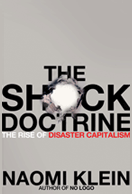The Shock Doctrine

Caution, 'Disaster Capitalism' at Work
Katharine Dunn, The Oregonian, December 2, 2007
Those of us who imagine economists to be mild souls preoccupied with tedious abstractions are in for a shock from The Shock Doctrine: The Rise of Disaster Capitalism, Naomi Klein's stunning, polemic re-examination of the last 30-plus years in the history of free-market capitalism. If we bought the myth of corporate globalization as a benign and bloodless process, Klein has more jolts in store.
The Canadian Klein is a columnist for The Nation and The Guardian and a former fellow at the London School of Economics. Her work on this, her third book, began in 2004, when she spent time in Iraq reporting on the reconstruction process for Harper's magazine. Her research is massive, meticulously documented and laid out in fluid, accessible and intriguing stories.
Klein's indictment revolves around Milton Friedman, the Nobel Prize-winning guru of the University of Chicago School of Economics and the brains behind the movement for unregulated corporate trade, the elimination of public services and the eradication of organized labor.
Klein begins in the 1950s, the depths of the Cold War, when Friedman refined his theory of pure capitalism as a counter to the threat of communism and a radical alternative to the mixed checks-and-balances system that was installed under the influence of economist John Maynard Keynes to combat the Great Depression. Under Friedman's precise mathematical theorem, the only functions permitted for government are police and armies. Everything else should be privatized.
With eager financial support from corporate interests, Friedman's theories made the Chicago school the powerhouse of academic economics in the U.S. The search for a live test laboratory -- a nation to erase and re-create from scratch -- did not take long.
When Augusto Pinochet's military junta prepared for the takeover of Chile in 1973, Friedman's students handed him a complete plan of economic reform in advance. Friedman himself visited the new dictator, urging him to press even harder -- by dint of troops, tanks and death squads -- at selling state-owned property, utilities and services to American corporations. The plan also included eliminating public medical care, education and transportation; arresting, torturing and executing labor leaders, social workers, academics and other troublemakers; and throwing hundreds of thousands out of work. The aim was to shock the entire population into stunned acquiescence to the new corporate economic policies. The term in use was "shock therapy."
The effect was to impoverish the majority of the population while enriching those in power. International corporations, being on the plush end of the equation, were delighted. The Chicago Boys, as Friedman's students were known, were ready for similar actions in Argentina, southern Brazil, Bolivia and beyond. By the 1980s large segments of Africa and Asia also had submitted to Friedman's shock treatment.
During this period, Friedman formalized his thinking on the tactical advantages of disaster. War and military coup were not the only ways to cause the mass discombobulation necessary to institute his policies. Natural catastrophe or monetary meltdown could work just as well. "Crises," Klein explains, "are, in a way, democracy-free zones -- gaps in politics as usual, when the need for consent and consensus do not seem to apply."
There was plenty of support for Friedman's approach in Washington, D.C., under the name of Reagonomics. Donald Rumsfeld, Dick Cheney, James Baker, Paul Bremer, Richard Perle and Paul Wolfowitz were among Friedman's disciples. The International Monetary Fund, led by Chicago adherents, was on board.
In The Shock Doctrine this history leads to Sept. 11, 2001, when disaster struck the United States. Others have dealt extensively with the impact on civil liberties. Klein focuses on the enormous homeland security industry that has erupted, the "Disaster Capitalism Complex," as she dubs it. She documents the privatizing of governmental functions, and if we knew that Lynne Cheney's old company, Lockheed-Martin, was controlling air traffic, it still might surprise us to learn that the same corporation sorts our mail, issues Social Security checks and does many other previously governmental chores.
Klein spends time in and on Iraq, and her perception of the effects of privatizing the war is pertinent far beyond the recent Blackwater scandal. Bremer, the former U.S. envoy and always a Freidmanite, fired teachers, doctors, nurses and engineers as well as the police and military in his de-Baathification purge. Though Bremer quickly auctioned off the nation's assets and declared Iraq "open for business" within weeks of the fall of Baghdad, there have been no international corporate investors. No McDonald's in Iraq. No Wal-Mart. The effort to create a capitalist model in the Middle East has failed. Iraq has gone, in Klein's terms, "from Blank Slate to Scorched Earth."
Meanwhile, back in the United States, the reconstruction in the wake of Hurricane Katrina is a corporate gold mine. Friedman died in 2006 at the age of 94. His last published work was a September 2005 op-ed piece in the Wall Street Journal pointing out the free-market opportunities presented by the destruction of New Orleans.
The Shock Doctrine is serious and exhilarating with the buzz of inside information and revealed connections. The book is ultimately hopeful because, as Klein points out, the shock wears off.
Those of us who imagine economists to be mild souls preoccupied with tedious abstractions are in for a shock from The Shock Doctrine: The Rise of Disaster Capitalism, Naomi Klein's stunning, polemic re-examination of the last 30-plus years in the history of free-market capitalism. If we bought the myth of corporate globalization as a benign and bloodless process, Klein has more jolts in store.
The Canadian Klein is a columnist for The Nation and The Guardian and a former fellow at the London School of Economics. Her work on this, her third book, began in 2004, when she spent time in Iraq reporting on the reconstruction process for Harper's magazine. Her research is massive, meticulously documented and laid out in fluid, accessible and intriguing stories.
Klein's indictment revolves around Milton Friedman, the Nobel Prize-winning guru of the University of Chicago School of Economics and the brains behind the movement for unregulated corporate trade, the elimination of public services and the eradication of organized labor.
Klein begins in the 1950s, the depths of the Cold War, when Friedman refined his theory of pure capitalism as a counter to the threat of communism and a radical alternative to the mixed checks-and-balances system that was installed under the influence of economist John Maynard Keynes to combat the Great Depression. Under Friedman's precise mathematical theorem, the only functions permitted for government are police and armies. Everything else should be privatized.
With eager financial support from corporate interests, Friedman's theories made the Chicago school the powerhouse of academic economics in the U.S. The search for a live test laboratory -- a nation to erase and re-create from scratch -- did not take long.
When Augusto Pinochet's military junta prepared for the takeover of Chile in 1973, Friedman's students handed him a complete plan of economic reform in advance. Friedman himself visited the new dictator, urging him to press even harder -- by dint of troops, tanks and death squads -- at selling state-owned property, utilities and services to American corporations. The plan also included eliminating public medical care, education and transportation; arresting, torturing and executing labor leaders, social workers, academics and other troublemakers; and throwing hundreds of thousands out of work. The aim was to shock the entire population into stunned acquiescence to the new corporate economic policies. The term in use was "shock therapy."
The effect was to impoverish the majority of the population while enriching those in power. International corporations, being on the plush end of the equation, were delighted. The Chicago Boys, as Friedman's students were known, were ready for similar actions in Argentina, southern Brazil, Bolivia and beyond. By the 1980s large segments of Africa and Asia also had submitted to Friedman's shock treatment.
During this period, Friedman formalized his thinking on the tactical advantages of disaster. War and military coup were not the only ways to cause the mass discombobulation necessary to institute his policies. Natural catastrophe or monetary meltdown could work just as well. "Crises," Klein explains, "are, in a way, democracy-free zones -- gaps in politics as usual, when the need for consent and consensus do not seem to apply."
There was plenty of support for Friedman's approach in Washington, D.C., under the name of Reagonomics. Donald Rumsfeld, Dick Cheney, James Baker, Paul Bremer, Richard Perle and Paul Wolfowitz were among Friedman's disciples. The International Monetary Fund, led by Chicago adherents, was on board.
In The Shock Doctrine this history leads to Sept. 11, 2001, when disaster struck the United States. Others have dealt extensively with the impact on civil liberties. Klein focuses on the enormous homeland security industry that has erupted, the "Disaster Capitalism Complex," as she dubs it. She documents the privatizing of governmental functions, and if we knew that Lynne Cheney's old company, Lockheed-Martin, was controlling air traffic, it still might surprise us to learn that the same corporation sorts our mail, issues Social Security checks and does many other previously governmental chores.
Klein spends time in and on Iraq, and her perception of the effects of privatizing the war is pertinent far beyond the recent Blackwater scandal. Bremer, the former U.S. envoy and always a Freidmanite, fired teachers, doctors, nurses and engineers as well as the police and military in his de-Baathification purge. Though Bremer quickly auctioned off the nation's assets and declared Iraq "open for business" within weeks of the fall of Baghdad, there have been no international corporate investors. No McDonald's in Iraq. No Wal-Mart. The effort to create a capitalist model in the Middle East has failed. Iraq has gone, in Klein's terms, "from Blank Slate to Scorched Earth."
Meanwhile, back in the United States, the reconstruction in the wake of Hurricane Katrina is a corporate gold mine. Friedman died in 2006 at the age of 94. His last published work was a September 2005 op-ed piece in the Wall Street Journal pointing out the free-market opportunities presented by the destruction of New Orleans.
The Shock Doctrine is serious and exhilarating with the buzz of inside information and revealed connections. The book is ultimately hopeful because, as Klein points out, the shock wears off.






















